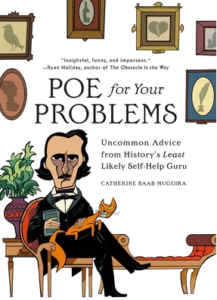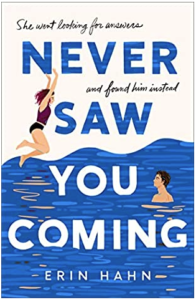I honestly wasn’t sure when I started reading this book where Catherine Baab-Muguira was going with it, and to be completely honest, I’m still not sure how to categorize this work now that I’m done reading it either. I do know that I finished reading this with stars in my eyes and hope in my heart, and if that isn’t the point of any good self-help manual then I don’t know what is.
 Here’s the thing: while the book allegedly seeks to have readers learn from the absolute dumpster fire that was Edgar Allan Poe’s life, his life serves as about 50% model and 50% cautionary tale, as wittily depicted in this volume. Poe For Your Problems doesn’t claim to be a biography of the famed author and poet but frankly is one of the best popular biographies I’ve ever read, humorous and honest and not above leaning in to 21st century mores and manners in examining the good, bad and absolutely cringe aspects of Poe’s life. Ms Baab-Muguira shows how weirdly relatable his life is to the modern American reader’s, whether it be in matters of education, career or romance. There are plenty of flaws and transgressions that she’s quick to admonish — like Poe marrying his 13 year-old cousin, ewwwwww — but even more that she highlights as being full of lessons for today’s reader. For a far more relatable anecdote in the field of romance, for example, Poe may not have been the first celebrity to do the equivalent of sliding into his fans’ DMs to disastrous effect, but he certainly was not the last. So if you’re gonna be messy on social media about your love life, don’t feel too bad about it: people who should probably know better have been doing it since time immemorial, and everything still worked out okay eventually!
Here’s the thing: while the book allegedly seeks to have readers learn from the absolute dumpster fire that was Edgar Allan Poe’s life, his life serves as about 50% model and 50% cautionary tale, as wittily depicted in this volume. Poe For Your Problems doesn’t claim to be a biography of the famed author and poet but frankly is one of the best popular biographies I’ve ever read, humorous and honest and not above leaning in to 21st century mores and manners in examining the good, bad and absolutely cringe aspects of Poe’s life. Ms Baab-Muguira shows how weirdly relatable his life is to the modern American reader’s, whether it be in matters of education, career or romance. There are plenty of flaws and transgressions that she’s quick to admonish — like Poe marrying his 13 year-old cousin, ewwwwww — but even more that she highlights as being full of lessons for today’s reader. For a far more relatable anecdote in the field of romance, for example, Poe may not have been the first celebrity to do the equivalent of sliding into his fans’ DMs to disastrous effect, but he certainly was not the last. So if you’re gonna be messy on social media about your love life, don’t feel too bad about it: people who should probably know better have been doing it since time immemorial, and everything still worked out okay eventually!
The thing is, PFYP feels a lot like a humorous biography with plenty of (gosh, it feels weird to say but here goes) morals for readers to learn from. The cautionary tales are easiest to nod along to, ofc: don’t marry a thirteen year-old, don’t drink to excess, don’t gleefully burn every professional bridge while struggling to live off of bread and molasses. But it’s the sideways lessons that are the most poignant, and which provide the chewiest food for thought. We don’t need necessarily to be less neurotic, more together people in order to find happiness and success, Ms Baab-Muguira tells us. Sometimes, it’s okay to lean into our less sociable, less decorous, less polite instincts in order to remain true to ourselves and leave behind something worthwhile.








